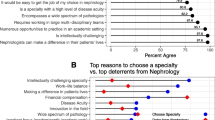Abstract
Objective:To determine whether current fellowships in general internal medicine (FGIM) meet the perceived needs and objectives of physicians entering careers in academic internal medicine.
Design:A modified Delphi method yielded the 18 curricular elements included in the mailed survey. Participants outlined both actual and ideal fellowship experiences by rating the degree of emphasis of each curricular element on a Likert scale. Respondents then prioritized elements by rank-ordering them on perceived importance. Current job descriptions and opinions on related issues in FGIM were collected.
Participants:Potential fellows, current fellows, and recent graduates were surveyed. Individuals were identified through the Society of General Internal Medicine associates’ mailing list and solicitation of program directors. Nonfellow associates served as the proxy group for potential fellows.
Measurements and main results:579 surveys were mailed; 348 (60%) responses were received, of which 288 (50%) were suitable for analysis. Of all respondents, 38% were current fellows and 40% were recent graduates. When asked to prioritize educational needs during fellowship training, respondents ranked research methodology, ambulatory medicine, critical review of the literature, epidemiology, biostatistics, teaching skills, medical consultation, grant writing, preventive medicine, and design of educational curriculum as the top ten. Only minor deviations in rank order were found between graduates and nongraduates. Mean Likert scale scores for degree of emphasis of each curricular element in graduates’ actual fellowships were compared with mean scores for graduates’ ideal fellowship descriptions. High-priority elements that were perceived as adequately emphasized included research methodology, critical analysis of the literature, epidemiology, and biostatistics. High-priority elements that were pereceived as inadequately emphasized included ambulatory medicine, teaching skills, medical consultation, grant writing, preventive medicine, and design of educational curricula.
Conclusions:FGIM largely meet the expectations of their fellows for preparation for research responsibilities. However, several curricular elements concerned with preparation for future clinical and teaching responsibilities are perceived by graduates as underemphasized. These areas deserve increased emphasis during fellowship training to better prepare fellows for their future roles in academic general internal medicine.
Similar content being viewed by others
References
Directory of primary care internal medicine residency and fellowship training programs. Washington, DC: Society of General Internal Medicine, 1988.
Henke CJ, Epstein WV. The training of United States rheumatologists, 1927–1976. Archritis Rheum. 1977;22(2):187–96.
Friedman RH, Pozen JT, Rosencrans, AL, Eisenberg JM, Gertman PM. General internal medicine units in academic medical centers: their emergence and functions. Ann Intern Med. 1982;96:233–8.
Friedman RH, Pozen JT. The academic viability of general internal medicine. Ann Intern Med. 1985;103:439–44.
Author information
Authors and Affiliations
Rights and permissions
About this article
Cite this article
Orlander, J.D., Callahan, C.M. Fellowship training in academic general internal medicine. J Gen Intern Med 6, 460–465 (1991). https://doi.org/10.1007/BF02598172
Issue Date:
DOI: https://doi.org/10.1007/BF02598172




